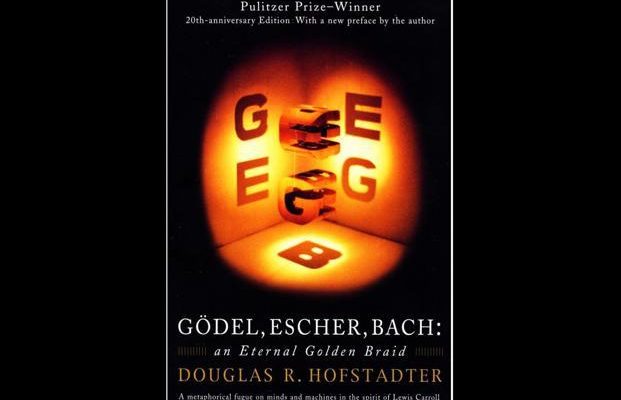Besides being a profound and entertaining meditation on human thought and creativity, this book looks at the surprising points of contact between the music of Bach, the artwork of Escher, and the mathematics of Gödel. It also looks at the prospects for computers and Artificial Intelligence (AI) for mimicking human thought.
Twenty years after it topped the bestseller charts, Douglas R. Hofstadter’s Gödel, Escher, Bach: An Eternal Golden Braid is still something of a marvel. Besides being a profound and entertaining meditation on human thought and creativity, this book looks at the surprising points of contact between the music of Bach, the artwork of Escher, and the mathematics of Gödel. It also looks at the prospects for computers and artificial intelligence (AI) for mimicking human thought.
For the general reader and the computer techie alike, this book still sets a standard for thinking about the future of computers and their relation to the way we think.
Hofstadter’s great achievement in Gödel, Escher, Bach was making abstruse mathematical topics (like undecidability, recursion, and ‘strange loops’) accessible and remarkably entertaining. Borrowing a page from Lewis Carroll (who might well have been a fan of this book), each chapter presents dialogue between the Tortoise and Achilles, as well as other characters who dramatize concepts discussed later in more detail. Allusions to Bach’s music (centering on his Musical Offering) and Escher’s continually paradoxical artwork are plentiful here. This more approachable material lets the author delve into serious number theory (concentrating on the ramifications of Gödel’s Theorem of Incompleteness) while stopping along the way to ponder the work of a host of other mathematicians, artists, and thinkers.
“The world has moved on since 1979, of course. The book predicted that computers probably won’t ever beat humans in chess, though Deep Blue beat Garry Kasparov in 1997. And the vinyl record, which serves for some of Hofstadter’s best analogies, is now left to collectors. Sections on recursion and the graphs of certain functions from physics look tantalizing, like the fractals of recent chaos theory. And AI has moved on, of course, with mixed results. Yet Gödel, Escher, Bach remains a remarkable achievement. Its intellectual range and ability to let us visualize difficult mathematical concepts help make it one of this century’s best for anyone who’s interested in computers and their potential for realintelligence.” Richard Dragan
Douglas Hofstadter’s book is concerned directly with the nature of “maps” or links between formal systems. However, according to Hofstadter, the formal system that underlies all mental activity transcends the system that supports it. If life can grow out of the formal chemical substrate of the cell, if consciousness can emerge out of a formal system of firing neurons, then so too will computers attain human intelligence. Gödel, Escher, Bach is a wonderful exploration of fascinating ideas at the heart of cognitive science: meaning, reduction, recursion, and much more.
It’s rare enough to read a good book. Still rarer is a great book that expands not just human understanding but also human thought. Perhaps not as groundbreaking a work of science as Darwin’s Origin of Species, Godel, Escher, Bach comes close to it in reforming the way we think about the world. If you have read it before, you know its strength (and after 20 years, it is well worth revisiting). If you have not read the book, here is a simple summary of what you’ve missed.
By looking at the brilliant minds of mathematician Kurt Godel, graphic artist M. C. Escher, and composer Johann Sebastian Bach, computer-science and cognitive-science professor Douglas Hofstadter ties together the aesthetic gift of pattern recognition and manipulation with theories on artificial intelligence, human intelligence, and the essence of self-awareness. Does that do the book justice? Not at all; Godel, Escher, Bach cannot be explained without delving deeply into the structure of the book itself and the analysis of self-representation Hofstadter weaves through his appreciation of the art of Bach, the designs of Escher, and the theories of Godel.
Godel, Escher, Bach is not a simple read. The ideas are complex and the logic subtle. But it is a completely satisfying book, and reading it is one of those rare experiences when you leave feeling smarter than when you started. (www.goodread.com)
Gödel, Escher, Bach won the Pulitzer Prize for general non-fiction and the National Book Award for Science. Martin Gardner’s July 1979 column in Scientific American stated, “Every few decades, an unknown author brings out a book of such depth, clarity, range, wit, beauty and originality that it is recognized at once as a major literary event.”
Biography
Douglas Richard Hofstadter (born February 15, 1945) is an American professor of cognitive science whose research focuses on the sense of “I”, consciousness, analogy-making, artistic creation, literary translation, and discovery in mathematics and physics. He is best known for his book Gödel, Escher, Bach: An Eternal Golden Braid, first published in 1979. It won both the Pulitzer Prize for general non-fiction and a National Book Award (at that time called The American Book Award) for Science. His 2007 book I Am a Strange Loop won the Los Angeles Times Book Prize for Science and Technology.
For Summer 2007, the Massachusetts Institute of Technology created an online course for high school students built around the book. (wikipedia)

